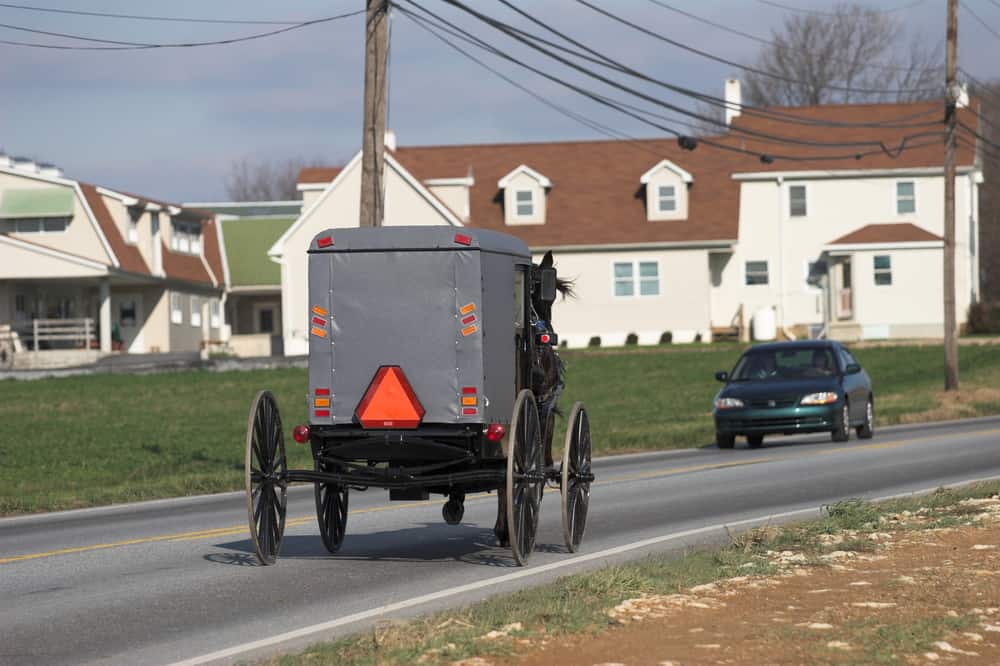
On the importance of dialogue with—rather than withdrawal from—those whose theological understandings differ from ours.
The question was posed with deadly calm. The poise and care as he looked past the other members of the group and into my eyes alerted me that it had been considered for some time, awaiting the right, doubtless prayerful moment to be spoken aloud.
“Jim, based on some of the things you’ve said, I have to ask. Are you gay?”
I was. Not only gay, but out to the vast majority of friends and coworkers.
The man asking so bluntly about my sexual orientation was an Old Order Amish minister, leading a group of Amish men with whom I had built an alliance and worked for some time. His question was a challenge in what had, until then, been a neutral forum. I alternately told myself that I remained discrete to respect the Amish belief that homosexuality is a sin, or struggled with the cowardice of an ultimately untenable secrecy. However, at that moment my motives no longer mattered. I could blatantly lie (an impossible moral choice), or say a brief prayer, tell the truth, and accept the consequences to follow.
And so, to paraphrase Robert Frost, I continued on the road less traveled by, and that has made all the difference.
A gay man’s journey to the Old Order Amish
My initial journey, ironically enough, is identical to the journeys of those who are led to renounce their same-sex desires. As an early adolescent my attraction to other boys was a curse that I prayed God would remove. Instead it grew stronger, and over time I resigned myself to the “reality” that I was abandoned by God. Without a moral compass, hedonism ruled my intimate moments, left relationships shallow and confusing, and created a void in my life. Eventually frustration and exhaustion turned me back to God, but this time rather than a demanding adolescent prayer for deliverance, I was left helpless, asking the more genuine question: What do you want of me?
And here my story diverges from those God so often prevents from acting on their same-sex desires. I believe that he speaks to all who seek his will and guides us in the path he intends for our lives. In my case he demanded a respect, for myself and for others, that was sorely lacking. He chastised my hedonism and called me to remember that we are all his children. And yet I did not feel chastened for my sexual orientation. My sin came from the selfish disdain with which I squandered the gift of my sexuality.
During this time I was a therapist with a master’s degree, and I returned to school to pursue my doctorate in psychology. Living near several Old Order Amish settlements, I was intrigued by their sect and culture. Eventually my work brought me into contact with them, and my respect and admiration for their beliefs deepened. In particular I better understood their separation from “the world,” the emphasis on family, church, and community as a boundary to that world, and the purpose of their plain dress and limited access to transportation and technology as means to assure that they remain apart from the evil that surrounds them.
And as my work with the Amish deepened, so too did my love and trust of several families. They guided my efforts as I partnered with other professionals to create, expand, and build on existing models of mental health programs and services. These were accepted because they respected Amish beliefs. Those early days were odd times. I felt the unmistakable tug of God’s leading to do this work. That did not stop me from questioning the wisdom of going forward. Ever present was the awareness that while the Amish remain separate from the world they are far from cloistered. It was only a matter of time before a disgruntled community member learned I was gay and began sharing the news. That would light the fuse, and from there all my efforts would explode, although I could not predict when or what the long-term consequences would be. I was learning to trust God in an entirely different way.
The fuse is lit
Counseling Old Order Amish clients outside Amish-run services frequently involves court-ordered or similarly mandated treatment, since many perceive mental health professionals as an arm of the world and thus remain skeptical. Counseling with these clients is further complicated by the need to shed the normal “persona.” They do not enter a session with the preconceived roles of “professional” and “client” that we are accustomed to encountering. Accordingly, my early work often involved those mandated to attend, including those having committed sexual offenses, and required a skill set with much greater personal transparency than my usual style. In learning to work with these (primarily male) Amish clients, I also stumbled upon several who struggled with same-sex feelings.
As a younger man I was a vocal advocate for gay rights, strident and unbending whenever the topic was broached. Over the years my experiences have taught me that the Lord indeed works in mysterious ways. I cannot logically explain why some Christians feel called to abstain from acting on their same-sex desires and others do not. However, I can respect the differences that arise as we each journey where God leads. My Amish clients struggling with same-sex issues, to a man (and one woman), have been clear in their belief that their desires themselves are inherently sinful. They have also been clear that their beliefs cannot be shared openly in their family, church, or community, lest others judge them.
And so in several cases I have become one-half of a two-person support group. I share my own sexuality and acceptance of it, as well as my simultaneous respect for their choice. We then struggle through their process of disbelief that a gay man could respect the view that homosexuality is a sin. In each case I detected in them a sense of relief. At least one person knows their secret and will not judge the fact that they struggle nor encourage them to disdain their desires.
Still, some clients were adolescents. I felt ethically impelled to divulge my sexuality to their parents. Others, I was aware, would at some point share that information with those to whom they were close. It was only a matter of time before I faced the consequences of these disclosures. Indeed, as one Amish friend with whom I shared my sexuality told me frankly, “Amish see gays as the lowest of the low.” The fuse was lit and burning.
Kaboom!
I had worked for several months with a small group of Amish men to create a booklet for their community addressing sexual sins. They knew of my services and requested my help, as they felt a need to address these sensitive topics, which their community was loath to confront. We had built a bond and shared in depth (with some obvious boundaries!). This was the context in which the minister asked me, pointblank, if I was gay, the vignette that opens this article. I responded honestly that I was. His question was not malicious. He was guarding the moral well-being of his community. My fear arose for those among the Amish who had known and held my secret and could now be disciplined for having done so. This minister was unsure about how to proceed with his newfound knowledge and shared it with his bishop, who held no such reservations. This bishop warned his church the next Sunday that I was to be avoided. Over time, my name was mentioned again and again, culminating in a warning about my presence as a counselor in an annual bishop’s meeting.
With that challenge to my credibility, for the first time I was overtly rejected. I found myself refused entry into some Amish homes. Others refused to enter my office. One of the programs I assisted in starting received queries to be sure that I was no longer involved. Some who learned that I was gay refused to work with me anymore. For these members of the community I was effectively shunned. When I am rejected in this way, my first all-too-human response is to feel hurt by these Christians who believe that they are rooting out evil by isolating me. My thoughts then become more compassionate, turning to those among their family and Amish friends who might struggle to manage their own same-sex desires and feeling a deep sadness for anyone indirectly shamed by the attitudes expressed by people they love.
And yet I also found that many who had known me were unfazed by my supposed notoriety. Others, meeting me for the first time, were likewise unconcerned. Being “outed” also allowed me to dialogue in a much larger venue, widely sharing my respect for their beliefs, a much-needed open platform, particularly with the clergy. As time passed, those who shunned me were a small minority.
Being “outed” has vastly expanded my advocacy for those Amish with same-sex desires as well. I have the opportunity to write and speak with bishops, ministers, and those with influence in the Amish community, voicing my concern for the “pariah” status of those who struggle with the very existence of these emotions. I advocate compassion and support for those attempting to live as they believe God reveals, suppressing their same-sex desires, but desperately needing the support of family, church, and community in their effort to do so. What initially appeared a death knell to my work has instead taken me in new directions and allowed me to encourage breaking the silence for many who would otherwise not be heard.
Lessons I have learned
And what has this journey taught me? I am certain that my faith has gained so much more than anything I could possibly give.
The experience reinforces the importance of dialogue over withdrawal. It would have been so easy to distance myself, pulling away from any effort to work with the Amish, rather than continue to serve. God has shown me how essential it becomes to “hear past the pain” and understand what others are saying. For example, one of the most poignant meetings to emerge from these events occurred with the Amish bishop who first said I should be avoided. I sought him out and we talked at length about our views, gaining a respect for each other that remains to this day.
I have better learned to distinguish humility from humiliation. As an older gay man, I recall too well the epithets, the threats, and the degradation that came in the early years of announcing my sexuality. The memory of that emotional bruising easily returns when another Christian frames my sexual orientation as a sin. And yet I am the one who chooses whether to be humiliated, or whether to humble myself in the presence of another child of God and exercise compassion for their beliefs as well. The distinction creates a powerful emotional healing.
I am reminded once again that genuine spirituality crosses theological lines. There are Amish men and women who love and support me, just as I love and support them, while we fundamentally disagree on the moral value of same-sex love. The spirit of God moves with restless energy among those who seek him.
I have also learned the importance of meeting with other believers seeking God’s will. CSA’s Oriented to Love dialogues invite conversation among those with differing views on homosexuality. I had the opportunity to attend one of these gatherings, and among the faith backgrounds represented was an Old Order Amish man. For me, one of the most powerful moments occurred as that time together drew to a close. We formed a circle and administered the sacrament of Communion, united in our love for each other and our love for Christ. God spoke in that gathering and beyond, reminding me that he guides my journey even when I fail to understand where or why.
And I am reminded of the verse from the prophet Amos: “Let justice flow down like waters, and righteousness like an ever-flowing stream” (5:24). I know not where God leads, but for the moment, I am so thankful that he gives a gay man a place with the Old Order Amish.
Jim Cates is author of Serving the Amish: A Cultural Guide for Professionals (Johns Hopkins University Press, 2014).



5 Responses
What a breathtaking story. The world needs so much more of this.
There are some issues where dialog is not what is needed. Whether or not acting on a same sex attraction is morally acceptable or not is one of them. There are boundaries in our faith and this is one of them. There is also truth and the truth is that acting on this impulse in not a thing allowed. But there is also grace. Grace is not acceptance of sin or dialog with sin. In a world so confused about this issue, evangelical Christians’ clear role is to teach truth with love and to support celibacy and change through the Holy Spirit’s work in the mind and heart. A united message on this issue from the church is deeply required by our Lord at this critical time. Remember that Paul, full of anguish, called for expelling from the church those who would not repent of gross immorality, lest other church members be caused to stumble. Many are stumbling today.
Heather Hall, for it is you I address. Homosexuality is not a choice. And if you believe that it is why then would any person make such a choice? To be ostracized from family, community and friends. To live in interminable pain and sadness always feeling like a last class citizen in every respect? Unable to express one’s love openly. And if, as it is certainly not in my case a choice; would our supposed creator fashion one in such a way? Gross immorality indeed. Racism and domestic violence is grossly immoral yet I do not here of anyone calling for Paul’s direction on expulsion for unrepentant wife beaters, racists or parents who chastise with the rod, inter alia.
What a fascinating article…unfortunate that many religions see so much of our human experience in such black and white.
Cates, despite claiming to be an out gay man who doesn’t view gay sex as sinful, is still crippled by internalized homophobia and his natural instinct seems to be to defend religous homophobia and attack secular gay activists. He has written articles defending ex-gay therapy and defended Ron Sider’s evidence-free attack on gay parenting for the sake of “balance” that Rush Limbaugh couldn’t have said better. Cates apparently was so damaged growing up in a toxic evangelical home that when he came out, he partied too much and then rather than taking responsibility for his reckless actions, he blamed it on his sexuality. Unfortunately, his bitterness remains but it should be directed towards christian homophobia and not secular gays who have little time for his sky daddy nonsense.